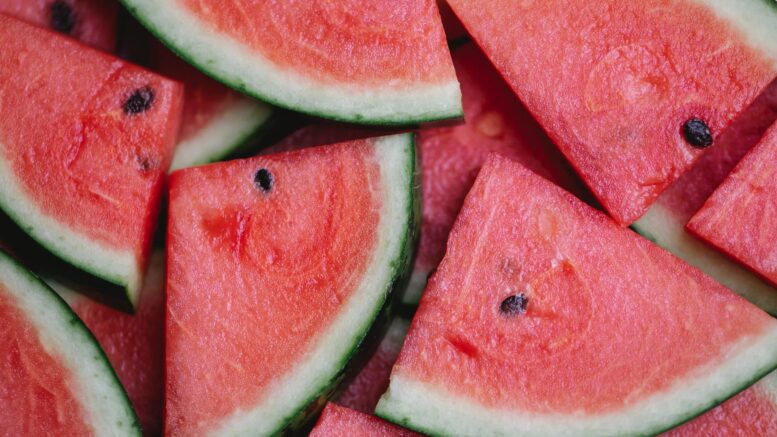Is Watermelon Good For UTI? 7 Ways Watermelon Helps UTI
UTI – Urinary tract infections (UTIs) are infectious inflammatory processes that affect all parts of the urinary system – bladder, urethra, and kidneys.
According to their localization, it is customary to divide them into infections of the lower sections (urethritis, cystitis) and conditions of the upper sections (pyelonephritis-kidney inflammation).
Most commonly UTIs develop as a result of the penetration of bacteria usually present in the intestine or on the skin of a person.
More than 70% of infections are caused by the bacteria Escherichia coli. Other common bacterial causes are Proteus Vulgaris, Pseudomonas aeruginosa, Klebsiella pneumonia, and gram-positive pathogens like Staphylococcus saprophyticus, Enterococcus faecalis, and Streptococcus agalactia.
Most young women, pregnant women, and women going through menopause suffer from frequent bladder infections.
The main principle of treating UTI is supportive treatment with increased fluid intake, which may be sufficient. Also, antibacterial therapy should be recommended.
Behavioral modifications play quite a big role in the prevention of UTI, which compromises: Timely bladder voiding, Postcoital voiding, Increased fluid intake, and Adequate genital hygiene.
On a bright note, an anti-inflammatory and intestinal-healthy diet can alleviate the symptoms.
As I already mentioned Increased fluid intake is considered to be both methods of treatment and prevention of UTI
Now which sweet and juicy summer fruit with stripes has approximately 93% content of water?
That’s right, and The Answer is Watermelon
In summer counters of markets and shops are rapidly filling up with watermelons. Let’s see what their benefit is for UTI, and what the harm is. What advantages are hidden under the striped skin of a watermelon?
Does watermelon help with UTIs?
1) Watermelon Is A Natural Diuretic
You might have heard about “diuretics” if you or your close one suffers from high pressure. A diuretic – is a type of substance that increases urination.
As I already stated, watermelon is full of water; it increases the urine flow without straining the kidneys, which is beneficial during inflammatory processes of urinary structures – as in UTIs.
Worthy of mention urinary stones can because by urinary infection. The mainstay of prevention is taking a lot of fluids or diuretics,
We imagine it as a “washing out” infection and flushing the bladder.
2) Watermelon strengthens the immune system –
We consume about 10 mg of Vitamin C per 100 grams of watermelon; this, in turn, prevents the spread of different bacteria, viruses, and parasites by acidification of urine. It is often a recommended supplement to prevent UTIs in case of a history of recurrent UTIs.
There was an interesting study conducted by the Department of Urology, New York University Langone Medical Center, where a total of 110 pregnant women were randomized to receive ferrous sulfate, 200 mg/d, folic acid, 5 mg/d, and ascorbic acid-Vitamin C, 100 mg/d, or daily ferrous sulfate and folic acid only.
At 3 months, the presence of urinary infections in the ascorbic acid (Vitamin C)-treated group was significantly lower than in the ferrous sulfate and folic acid-only group
3) Lycopene
The red color of watermelon is due to antioxidants called lycopene. It fights free radicals, thus reducing the degree of the cell damage caused by inflammation. Watermelons contain over 4,500 micrograms of antioxidants per 100 grams – pretty powerful! And by the way, the riper the fruit, the more lycopene it contains.
4) Watermelon Helps Liver To Detoxify
The liver does a great job of getting rid of most toxins we consume. Most notably, ammonia – a waste product of proteins, which after the liver is processed by kidneys.
Watermelon helps the liver with the process of detoxification, thus letting the kidney rest, as they are already under stress from inflammation.
6) Helps control blood pressure
Urinary tract infections make the kidney susceptible to damage; damaged kidneys mean abnormal blood pressure control. Also, there’s a massive co-association between hypertension and UTI in the elderly population.
Watermelon is known to have a great influence on blood pressure management.
A 2014 year study by Florida State University supports that diet “The pressure on the aorta and the heart decreased after consuming watermelon extract,”
7) Beta carotene
The type of Vitamin A abundant in watermelon is proven to have positive effects on UTI and decrease the number of recurrences in patients suffering from recurrent UTIs. According to a study by Pubmed Vitamin, supplementation may have an adjuvant effect on treating RUTI.
Antibacterial Properties
It’s noteworthy that even though watermelons are beneficial during UTIs. Watermelons don’t have as powerful antibacterial actions as some other fruits, as the research states,” the highest antibacterial activity against all tested bacteria was in banana, pomegranate, orange, lemon, and apple respectively and the lowest antibacterial activity was in watermelon, kiwi, and papaya respectively.”
To sum up
Eating several watermelons daily has a refreshing effect and may “cleanse” the kidneys.
The bladder will be flushed out, the symptoms will alleviate and you will feel rehydrated and satisfied.
References:
https://www.ncbi.nlm.nih.gov/pmc/articles/
https://www.ncbi.nlm.nih.gov/pmc/articles/
https://news.fsu.edu/news/health-medicine/
https://pubmed.ncbi.nlm.nih.gov/
See Also
Is Watermelon Good for Diabetes?
Is Watermelon Good for Arthritis?

As a nutritionist, I research, find and experiment with recipes, natural diets and meal plans for weight loss, bodybuilding, and detoxing.
